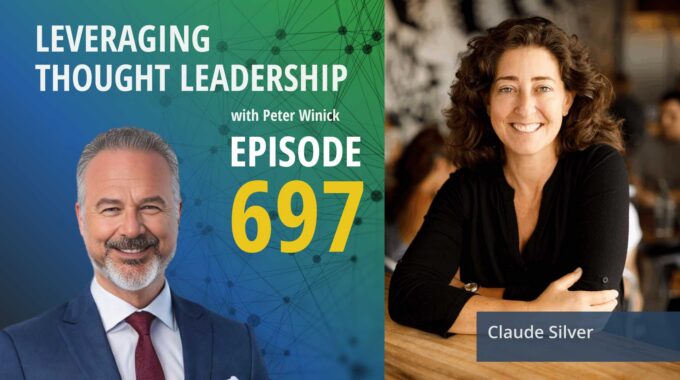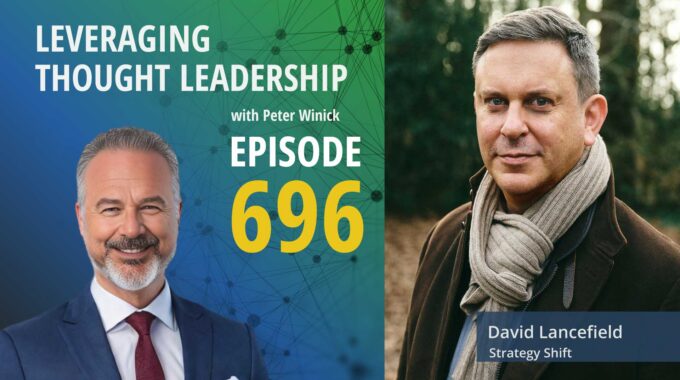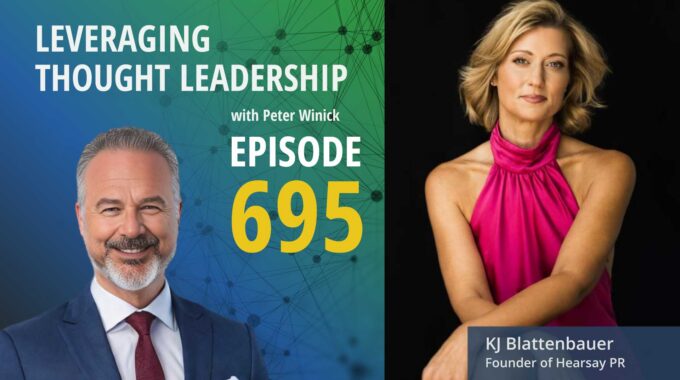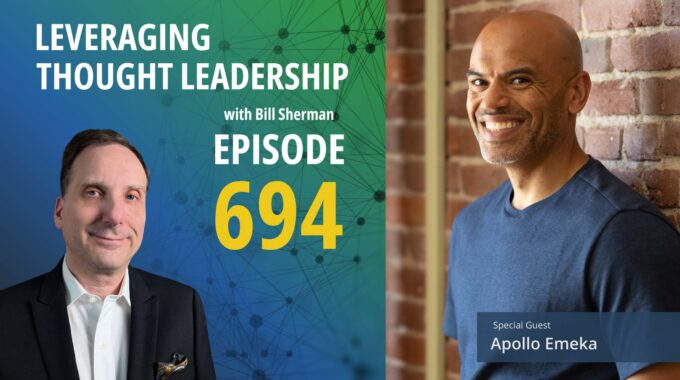Frameworks for connection, accountability, and performance This episode examines how psychological safety drives performance, how…
From Notebook to Transformation | Klint Guerry
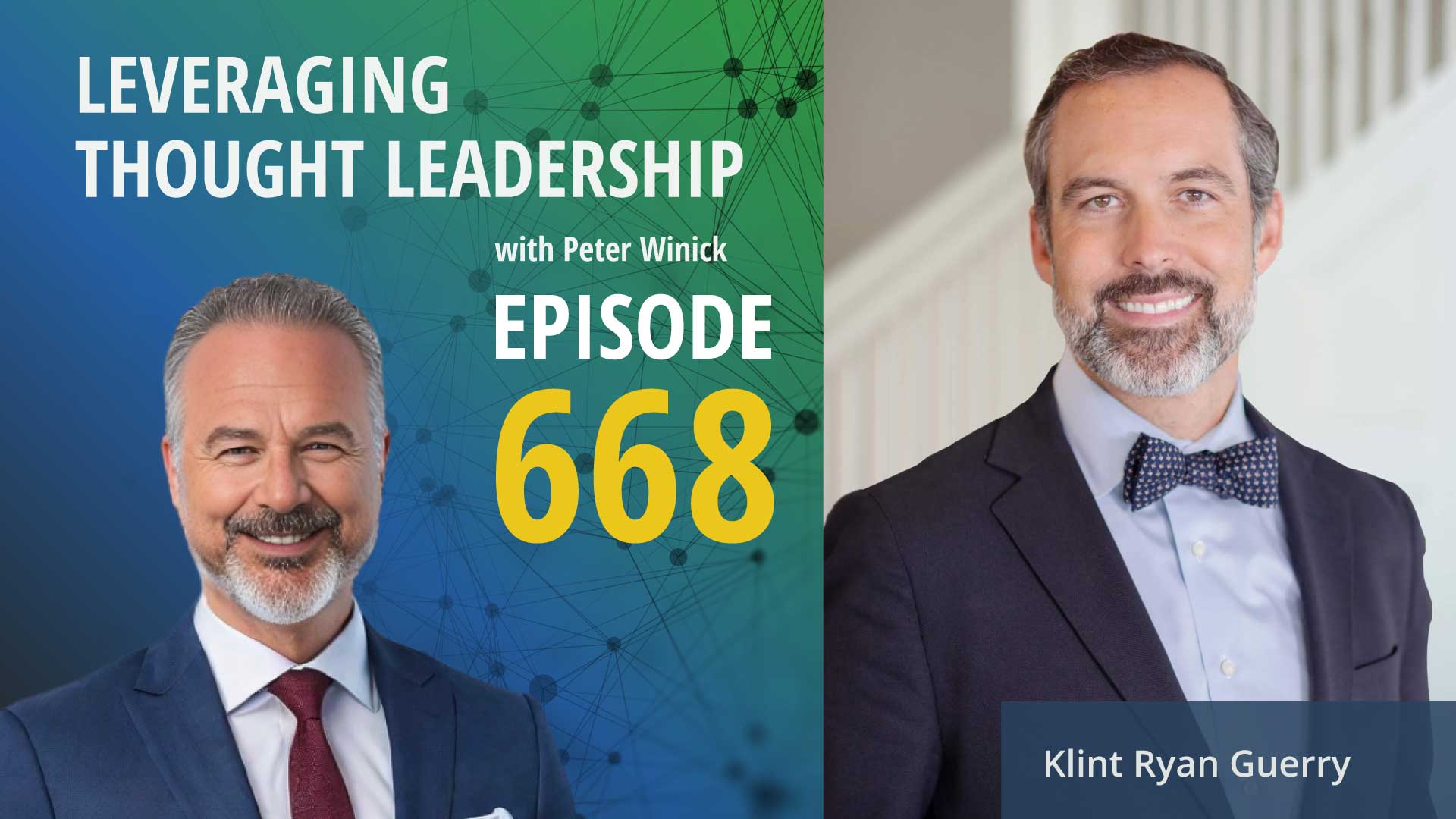
Building Daily Habits for Extraordinary Growth
Transformation doesn’t come from charisma alone—it comes from process. This episode explores a five-step system that turns responsibility, focus, curiosity, humility, and service into daily habits. The conversation shows how disciplined frameworks, simple tools, and structured methods can drive personal growth, stronger teams, and lasting impact.
What if the key to transformation isn’t a new app, a coach, or a seminar—but a 99-cent notebook?
In this episode of Leveraging Thought Leadership, Peter Winick sits down with Klint Guerry, Group Vice President at Sewell Automotive Companies and author of “A Guide to Self Disruption”. Klint reveals how a simple daily practice evolved into a powerful system for accountability, focus, and lifelong learning.
At the heart of Klint’s thought leadership is the Guerry Notes Process—a structured, five-step method that has shaped his career, his leadership, and now, the lives of others. It’s not about lofty theories or abstract models. It’s about discipline. Responsibility. Curiosity. Service. Humility. These principles are practical, repeatable, and deeply transformative for anyone serious about growth.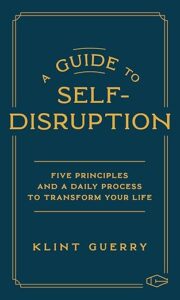
Klint explains how great leaders, teams, and individuals thrive not on charisma alone, but on process. Just as top athletes rely on rigorous training, professionals need daily systems to harness their strengths, stay focused, and deliver extraordinary results. His framework isn’t just personal—it applies to mentoring, team development, and building high-performance cultures.
The book itself functions as both a mentor and a tool. With prompts, exercises, and curated wisdom, it bridges the gap between intention and action. For leaders, it’s a way to instill accountability and growth in their organizations. For individuals, it’s a guide to disrupting old patterns and unlocking potential.
Klint’s work is a reminder that thought leadership is about more than ideas—it’s about building processes that others can adopt, adapt, and thrive within. Whether you’re a CEO, a rising professional, or a mentor, his insights will challenge you to ask: What system am I using to become the best version of myself?
Three Key Takeaways
- Process beats charisma. Long-term success isn’t about charm or improvisation—it’s about having a disciplined, repeatable system that drives accountability and results.
- Five principles power growth. Responsibility, focus, curiosity, humility, and service form the foundation of the Guerry Notes Process, helping leaders and teams consistently elevate performance.
- A simple tool creates transformation. A 99-cent notebook, used daily with intention, can become a personal operating system for lifelong learning, stronger mentorship, and building high-performance cultures.
If Klint’s episode got you thinking about the power of process, discipline, and structure in driving growth, you’ll want to dive into this conversation with Manja Horner on Thought Leadership and Adult Learning. Both episodes explore how simple, repeatable systems can transform potential into performance—whether through a daily notebook practice or by designing learning experiences that stick. Together, they show you how to move beyond inspiration into measurable impact.
Listen here to see how you can apply these ideas to sharpen focus, accelerate growth, and create lasting change: Thought Leadership and Adult Learning with Manja Horner.
Transcript
Peter Winick And welcome, welcome, this is Peter Winick. I’m the founder and CEO at Thought Leadership Leverage and you’re joining us on the podcast today which is Leveraging Thought Leadership. My guest is Klint Guerry. Clint is the group vice president at Sewell Automotive Companies and served in myriad support, productive and leadership roles since joining the company back in 2001 and he’s held a senior leadership position at Sewall for 16 years as a group vice-president. And are responsible for day-to-day operations of their BMW, Mini, and Ineos campuses in the Dallas-Fort Worth marketplace. It’s a 114-year-old family business. They’ve got over 4,000 associates, and he is also on the board of the Magdalen House, the Dallas College Foundation, and a number of industry-related committees. He’s the author of, and this is what we’re gonna get into today, a guide to self-disruption, five principles, and a daily process to transform your life, as well as the Guerry Notebook companion. He’s got a B.A. In business administration, and he and his wife have three children. So, there we go. How are you today?
Klint Guerry That was a mouthful, Peter.
Peter Winick That was really a lot. That was so I mean, you and I were chatting a while ago. Why don’t we start with sort of your origin story? Because, yeah, you know, running a bunch of car dealerships and a family, but that’s a fucking dandy. But let’s start with the life story, because that’s where the real I think no pun intended, the rubber meets the road in terms of your story.
Klint Guerry I also appreciate car puns greatly, so feel free if you need to go that way.
Peter Winick Unintended one. I will just go over to you now.
Klint Guerry It was really good. No, I really appreciate it. Thank you, Peter. No, it’s just an incredible privilege to get to talk to you about my little book, A Guide to Self-Disruption and the Gary Notes Process, which for all intents and purposes is the thing that has led me to even having any sense of qualification to being able to talk to today. I’ll just give you the nickel story because I think it adds value at least to the process and to the book and why it happened. Grew up in a kid, I mean, no different than probably a lot of your, uh, if not most of your listeners, not the world’s greatest childhood set of circumstances. Uh, mom and dad were both, uh tragic alcoholics. My, my mother passed when I was 16 and my dad, my dad who was this really, really bright guy, although I really never knew that guy, he best I can tell he was, he was really pretty well already gone to his addictions by the time he was 18 years old. So by the time I came around You know, things were pretty long gone, but he, but he had done really well in banking in Texas. He was, uh, at 30 years old, he was the president of a bank in Texas, which was a pretty dang big deal. I mean, that was a little town in West Texas kind of second only to the mayor in power and prestige at that time. There was a very, very serious savings and loan scandal in Texas in the 1980s, which I can see you shaking your head so you know exactly what I’m talking about. But my father’s bank was one that was rolled into that and, and, and he kind of lost everything, but he, he really, from that point forward till the, until he died, he was really just a shell and, and, you know, people go through those challenging circumstances in life and some of them don’t make it out. Some of them add to their quiver of capability and they grow from it. Unfortunately, my father, his case and my mother’s, quite frankly, I think they were already so sick. Emotionally and physically that that they really didn’t have the ability to pick back up and move on so to get to me So by the time I was eight is really when I first started Recognizing that home life was not quite like my friends and Um, and it you know, I just had to grow up early I had to go up really young, you know taking kind of being responsible for myself by the Time my mother passed when I was 16 Uh, I was really just kind of on my own. I did live with my father, but we were as close to homeless as you could be with a roof over your head. Um, well, we, we had, uh, no water for most, most of the time, no electricity. Trying to study for school by candlelight is not as cool as you might think it was back in the 1700s and 1800s. And, and so as you can imagine, like the thought of, of really excelling at school or, uh. Even where I was going to go from there, I lived a very hand-to-mouth lifestyle. Sure. So, had to throw up.
Peter Winick You get into where you are today. I mean, give us the fast forward on the career track and then I wanna get.
Klint Guerry Yeah, so it’s a long fast forward here, but then I think it’s important to kind of set it up because when I was in my early 20s, just by provenance, I ended up in an organization with a job for 10 bucks an hour that I really loved, and that was at a cardio shift, and it was at company called Sewell Automotive Company. And I had piecemealed a little bit of school, but I’ve… I really had never taken it seriously about trying to pursue an education beyond high school. Okay. And I found myself in this organization that I really thrived and that I think it’s a fascinating point that I got to see firsthand is how a company and great leadership can almost fill the gaps for a kiddo. In many ways, the company provided the parenting and the structure and the expectations for me that I never had for myself and I had never been given. And encouraged me to pursue an education, et cetera, et cetera. So I did all of the- It all sounds like right time, right place, right? Oh, for sure. And then there’s another piece to this which is probably equally important is that I started to have a tremendous amount of success. I mean, I’ve moved my way up the ranks and started doing really, really well financially. And I started gaining some confidence professionally. And then I met this girl. And this girl, she was amazing. And she- She was everything that I was not. And she grew up in precisely the opposite set of circumstances that I, that I did, you know, very, very strong family, mom and dad, family, faith, family of financial security expectations. I mean, my, my wife, she’s now my wife. That’s the good part of the story. But, um, you know when we were in our early twenties, uh, she was already contributing her full contribution annually to our IRA and I thought that was a guy named Ira. I’ve never even heard of such a thing. So I found myself in this confluence of pressures between a career that I knew that I had found something that I could maybe do, do more than expected. And then also a young lady that I have high expectations placed upon me by virtue of the fact that I didn’t, I didn’t want to bring her into my controlled chaos and that I really needed to grow up. Okay. And so. That’s where the notebook starts and that’s where the process starts really. Uh, May the 31st of 2004. I went to the office one morning. I decided I was going to set my life for change. I didn’t really know what that looked like. I knew that I suffered when it came to being responsible, accountable. I was very good with people. I’ve always been a good talker. Like I’ve never struggled in that regard. And, uh, but you know, charisma only gets you so far. And I needed to figure out how to become more of a Quite frankly, what I viewed as is a boring, old, stable person.
Peter Winick And I didn’t know if I liked to do it. So I congratulate you for achieving a goal of, yeah. No, no, no.
Klint Guerry Yeah, you can’t see, you know, if you’re listening to this, you’re not seeing me. I mean, I refer to myself often as old gray face, you know, big white beard, but I picked up what I did. This is just the really cool part is I picked it up that morning. My, I picked a notebook and, uh, You can’t see it. Peter can see it, but they took a notebook. And, uh it was just a blank really just stationary. I felt like I needed an accountability partner. Okay. When I went to the office that day. And that morning, May the 31st of 2004, I sat down at my desk and I spent the first 15 or 20 minutes and I really just began journaling about what it was that I was trying to accomplish this transformational change in my life. Love Ben. So I journaled and then I carried that notebook through me through, through with me through the rest of the day, which ultimately became days and weeks and months and years, but I’ve hatched upon a process that really transformed everything for me in how I was able to… Keep track of to do is manage my time, make sure that I was made my time most effectively to, to have the biggest impacts. Uh, I found I cracked a code for me to become a learner and really to become a student of the world and started this fire of insatiable desire to try to learn and grow, I started to see this immediate kind of revolutionary moment in my life that ultimately became something that, uh, I. Have done now faithfully in its entirety. I didn’t give you the whole process there, but I gave you a flavor. I’ve done that process faithfully, Peter, every single day of my life, literally with very, very few exceptions since May the 31st of 2004. And so it completely changed everything for me. Now, there was a point in October of 2012, which I’m sure you’ll ask me about next, whenever there was a great mentor of mine that dropped a pebble in the and said, I want you to. I want you to create this process for other people and write a book and that’s why you and I are here. So there’s the backstory.
Peter Winick If you’re enjoying this episode of Leveraging Thought Leadership, please make sure to subscribe. If you’d like to help spread the word about our podcast, please leave a five-star review at ratethispodcast.com forward slash LTL and share it with your friends. We’re available on Apple podcasts and on all major listening apps, as well as at thoughtleadershipleverage.com, forward slash podcast.
Peter Winick So this becomes your operating system, right? Your personal operating system. I love I love that. Yes. Oh, and then and then you start mentoring people. Right. Yes, in this methodology. And then somebody says, well, you need to really codify this and disseminated and be the evangelist, the ambassador of this process. And the process is basically a 99 cent notebook, right to start, obviously, this blank page. So tell me that so you start rendering people and I’m assuming that over the whatever 10 years or eight years it was between, when you started companies and write it down, you tweaked it, you modified it, you refined it, you got it down to categories that you would be writing about, right? Whether that’s, or, what is the typical template and the things that you focus on? And while, so there’s really good to it, right.
Klint Guerry Yeah, so there’s two things we’re discussing here. One is the notebook and the process itself, and that’s very simple. Yep. And that’s roughly a five-step process, which now it’s called the Gary Notes process, and it’s on Amazon, and you can buy it. It’s very simply. There was the other piece, which was October 12, my mentor, a guy named Dr. Jim Dennison, who said, I really think that this has value. It may not have value for the masses, but there’s gonna be a few people out there that really. This could have that same transformative nature for. And so the book, A Guide to Self-Disruption, there’s really three things. The first part of it is really about the process isn’t of itself, the daily process, why you should do it, how you should it, and really just the inspiration associated with. I’m just trying to sell you on the fact that whether you use my process and its rote behavior. Or not, it’s that every successful person that I’ve ever met with literally no exceptions has some kind of discipline methodology that they manage their life.
Peter Winick So in your world, how many sales professionals are in all the dealerships that you’re involved in?
Klint Guerry Just Sales Associates by the S.L.
Peter Winick People after selling cars every day.
Klint Guerry Or some? We have about, we have about 300.
Peter Winick And I would argue that when you onboard them, when you recruit them and you put them on, you don’t just say, oh, you’re, you are a charming, charismatic young man or young woman. Just you do, you do you, right?
Klint Guerry Correct we do have them at process we give them a methodology for which to find success right and in essence
Peter Winick Yeah, and I think that there are people that think all salespeople are, quote, winging it or oh, he’s got such charisma or he’s such a warm fellow or like a blah, blah,blah, blah. And if a process is done well, on the buy side, it’s invisible. You nobody wakes up one day and says, I feel like an unqualified lead. Like, I kind of I feel like a warm process. That’s way this morning, Peter. Yeah, you know, that’s not you identify yourself. So I think there’s a parallel here professionally and personally in terms of the power process. And you know, like anything else is almost like an athlete. You know, you can say, Wow, yeah, of course, that guy’s a basketball player or football player. Look at him. Yeah, well, I’m never gonna be a basketball player. I’m five, nine, right? I’m ever gonna be a football player too old. But even if I had the physical sort of hardware, I would still need to apply to that a process. There’s plenty of seven feet tall people out there that aren’t playing basketball professionally, there’s of you. Guys that are 65 to 50 that aren’t playing football. So it’s not just the hardware, if you will.
Klint Guerry It’s the difference between somebody being good and somebody being great. And the, cause you will find not certainly not at our stores here, but in my industry, you’re going to find a lot of sales associates. I would imagine that wing it, but you know, if you transition this over to just your personal life and using all the gifts that God gave you, all the amazing things that make you, you is that a disciplined methodology of which you kind of harness those talents and keep yourself focused. Hold yourself responsible, look for ways to be curious and grow, look for a ways that you can serve and really empower other people around you. That’s the process that brings the most out of you. It’s the, oh, it’s kind of like the pursuit of being extraordinary. So now…
Peter Winick The book’s out, well you get the notebook done.
Klint Guerry Notebook’s done, book’s out.
Peter Winick And now we’re on the other side of that process, right? And what has that meant for you? What is that, what are the doors that have opened? Where has it met expectations and is it disappointed you from that standpoint?
Klint Guerry But getting to do things like this has been a plus. So I, when I, when I finished writing the book, I mean, it took me a lot of years. It took me 12 years to write this dad gum book and it took me 12 to write the book. Not because I didn’t have a lot to write. It was actually much more of the opposite. It took me far more time to refine it down into something that was simple. I spent a lot of time with young people. And when I say young people, kiddos right out of the university. And, and I As much as I try to inspire them, I find that reading is not as, uh, prevalent as I would like for it to be. And maybe that’s true in adults as well. But that’s another one of those core principles of folks that you meet that you really admire their success is oftentimes you will find that they’re there, they have a very healthy method or means of learning and reading, you know, they’re, they are voracious readers oftentimes. And so
Peter Winick No, we know it learners. It’s not just as though I mean, I’m yeah, I love to read, but I think it’s this commitment to lifelong learning this commitment, to, you know, adopting new tools and learning new ways doesn’t mean you have to take on everything you ingest as a reader being aware and exposed to the ideas that are bubbling up out there.
Klint Guerry Let’s write something that wouldn’t intimidate somebody who isn’t a reader. Right. It was going to be something that would be attractive to people who already are, but at the same time that it wouldn’t be intimidating. And what it does, so the first half of what I’ve already mentioned is really the process. The second is the five principles, which the five principals in and of themselves are the refined points, basic fundamental or foundational points that I found in studying all of my years of studying. It’s like the Gray’s Cliffs Notes. That’s basically it. And, and so I refine that down to five principles, which are responsibility. I’ve kind of mentioned them already, but it’s responsibility, it’s focus, it’ curiosity, it is humility and it’s service. And then each of those five principles unpack into why they should matter to you. It is like curiosity. You just hit that nail on the head. It it’s learning to find in yourself a lifelong effort and desire to be curious, inquisitive, learn. Expand your mind, push yourself into other, uh, in the things, maybe, maybe other comfort zones or outside of your comfort zone and, uh and then in each of each chapter has a prompt, it has several questions and kind of provocative questions and, and exercises and things to, to help push this learning along. And then the third section of it is I, I love quotes. I love all the nuggets of wisdom that unfortunate enough to gather over the years. And so there’s, I didn’t pick, I picked a random number, but there’s roughly 287 bits of learning in there that are just from my own notebooks. And then there’s 50 great books list in the back. So in essence, what the book became is kind of a bit of a mentor in a book. Yeah, you used that word and that’s one of my favorite words. The book in itself can help you mentor yourself. It works spectacularly well, however, if you’re in a mentor-mentee relationship. Peter, you and I have talked about this before, but… You know, uh, as, as two great lovers of mentor relationships and think that that’s really important is that when you are a introduced to a mentor for the first time, often that can be an awkward exchange. Yeah, I don’t really know. It’s like a, it’s just a weird interview instead of their feet.
Peter Winick Other part of that is it could be awkward without structure. Hi, I’m your mentor. Okay, well, what did I sign up for? What I have found in my experience is the mentor mentee relationship has totally evolved from what it probably was when you and I were coming up to more of trying for it to be an equal exchange, right? So if I’m a insecure 22-year-old, and you’re the old dude, right? In your 50s or 60s, or, you know, wherever the case may be. The burden is on me to say what is it that I can do to provide value to Clint for giving me of his time and of his interest and all those things. And it could be things that I take for granted like maybe I’m better at social media than he is or tech or slang, I don’t know, whatever. There’s things that i’ve got as a younger person tuned into a different generation that I could give to you as well. And I think it’s gotta be mutually beneficial because the old model of. All right. Hey, Peter, will you mentor so-and-so? It’s like, oh, you know, like how many training wheels do I need to do? But if I’m feeling that it’s more mutual, that’s number one. And number two, if the mentee doesn’t live up to the expectation, I think the mentor has every right to say, all right, I’m out, like I, if I am taking this more seriously than you are, then I’d rather give up myself to someone that is keeping up with me or at least trying or whatever.
Klint Guerry Yes. That’s what I wanted to make. I wanted to make a book. I want to write a book that would help to codify that relationship and to bring out the best in both parties and also get both parties to dig deep and really get the mentor to share deep wisdom and learning and get the mentee out of their comfort zone and get them to be more vulnerable inside of that relationship. And so, um, and really… What are some of the great things that have come as a result of it besides getting to do things like this has really been seeing the fruits of, of the mentor mentee type, you know, I’ve gotten that’s something I probably, I didn’t think anybody even buy the daggum thing and, and, uh, and now to get letters and, to get feedback from people and talking about how it has knocked down some of those barriers and, some of them meaning, meaningfulness that people have found by, by capturing their
Peter Winick I think I design an intent when you, you know, words matter. When you call something a book, my brain goes to, I love books, I read two a week. That’s where I sit with a cup of coffee by myself and read a book or at the end of the day or on an airplane or whatever. Yours is a book but the click that it should have in the brain is it’s really meant to be shared. If you’re doing this only by yourself and only alone, you’re kind of missing the point. And maybe that’s the first read through it. You’re doing solo, but I think it is to be done with the intent of being a mentor or a mentee, it’d be great to be a mentees and say, Hey, I read this book boss, I think you should read it too. Maybe we can do some stuff together.
Klint Guerry It really is personal if you can really apply the information and the questions however you choose so you can think about it from a really deep introspective standpoint yes um and you can also think about again like we’re talking about this mentor mentee but you can also take the exact same questions the same principles and you can apply it inside of a team environment side of work it doesn’t have to be this deep personal reflection you can’t think about in terms of your individual job functions and how do we function together? And really where the opportunities for us to grow together and to build an even higher performing team. So it’s been incredibly rewarding on all fronts and I’m just excited to try to get more and more of them out there. That’s my primary goal at this point and really just get a chance to share more wisdom. And then quite frankly, as much as I love to learn, I’m getting to meet a lot of very fascinating folks where I’m learning more and more and from them. So this has been an accelerant. In many ways on our
Peter Winick I think that speaks to your mindset of being a lifelong learner. It’s the old adage of when the student’s ready, the teacher appears. And I think there’s a lot of truth to that. Anyway, this has been great. I appreciate your time. And thank you for sharing your journey and your story. And I look to hear more about it in the years to come.
Peter Winick To learn more about Thought Leadership Leverage, please visit our website at thoughtleadershipleverage.com. To reach me directly, feel free to email me at peter at thoughtleadershipleverage.com, and please subscribe to Leveraging Thought Leadership on iTunes or your favorite podcast app to get your weekly episode automatically.


